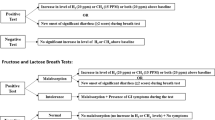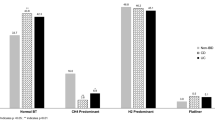Abstract
Background and Aims
Irritable bowel syndrome (IBS) patients frequently complain of gas-related symptoms, and the lactulose breath test (LBT) is a test that assesses the amount of fermented gas generated by bacteria in the bowel. We aimed to assess the relationship among intestinal gas volume, LBT result, and gastrointestinal symptom score in healthy control and functional bowel disorder (FBD) subjects.
Method
In 84 IBS subjects, 24 FBD subjects other than IBS, and 25 healthy controls, a symptom questionnaire that enquired about seven main symptoms, plain abdominal radiography and a LBT were checked on the same day. The intestinal gas volume was calculated as the gas volume score (GVS) with a digitalized image of plain supine abdominal radiographs.
Results
The GVS was greater in the LBT (+) group compared to the LBT (−) group (P = 0.02). The GVS was greater in the FBD and IBS groups than in the control group (P < 0.01). The GVS showed low but positive correlations with the severity and frequency of bloating, flatulence, abdominal pain, constipation, and tenesmus (P < 0.05). The severity of flatulence (P = 0.02) and the frequency of bloating (P = 0.02) in the LBT (+) group were significantly higher than those in the LBT (−) group.
Conclusions
Subjects with positive LBT had more gas-related symptoms and greater gas volume scores. Gas-related symptoms, positive LBT and increased GVS were significantly associated to each other. These findings can broaden the understanding of the pathophysiologic mechanisms of gas-related symptoms in IBS.





Similar content being viewed by others
References
Grundmann O, Yoon SL. Irritable bowel syndrome: epidemiology, diagnosis and treatment: an update for health-care practitioners. J Gastroenterol Hepatol. 2010;25:691–699.
McKee DP, Quigley EM. Intestinal motility in irritable bowel syndrome: is IBS a motility disorder? Part 1. Definition of IBS and colonic motility. Dig Dis Sci. 1993;38:1761–1762.
Azpiroz F, Bouin M, Camilleri M, et al. Mechanisms of hypersensitivity in IBS and functional disorders. Neurogastroenterol Motil. 2007;19:62–88.
Mertz H, Morgan V, Tanner G, et al. Regional cerebral activation in irritable bowel syndrome and control subjects with painful and nonpainful rectal distention. Gastroenterology. 2000;118:842–848.
Manabe N, Tanaka T, Hata J, Kusunoki H, Haruma K. Pathophysiology underlying irritable bowel syndrome—from the viewpoint of dysfunction of autonomic nervous system activity. J Smooth Muscle Res. 2009;45:15–23.
Chadwick V, Chen W, Shu D, et al. Activation of the mucosal immune system in irritable bowel syndrome. Gastroenterology. 2002;122:1778–1783.
Quigley EM. Germs, gas and the gut: the evolving role of the enteric flora in IBS. Am J Gastroenterol. 2006;101:334–335.
Ringel Y, Williams RE, Kalilani L, et al. Prevalence, characteristics, and impact of bloating symptoms in patients with irritable bowel syndrome. Clin Gastroenterol Hepatol. 2009;7:68–72.
Agrawal A, Whorwell PJ. Review article: abdominal bloating and distension in functional gastrointestinal disorders—epidemiology and exploration of possible mechanisms. Aliment Pharmacol Ther. 2008;27:2–10.
Chami TN, Schuster MM, Bohlman ME, et al. A simple radiologic method to estimate the quantity of bowel gas. Am J Gastroenterol. 1991;86:599–602.
Koide A, Yamaguchi T, Odaka T, et al. Quantitative analysis of bowel gas using plain abdominal radiograph in patients with irritable bowel syndrome. Am J Gastroenterol. 2000;95:735–741.
Maxton DG, Martin DF, Whorwell PJ, et al. Abdominal distension in female patients with irritable bowel syndrome: exploration of possible mechanisms. Gut. 1991;32:662–664.
Lewis MJ, Reilly B, Houghton LA, et al. Ambulatory abdominal inductance plethysmography: towards objective assessment of abdominal distension in irritable bowel syndrome. Gut. 2001;48:216–220.
Salvioli B, Serra J, Azpiroz F, et al. Origin of gas retention and symptoms in patients with bloating. Gastroenterology. 2005;128:574–579.
Serra J, Azpiroz F, Malagelada JR. Impaired transit and tolerance of intestinal gas in the irritable bowel syndrome. Gut. 2001;48:14–19.
Hernando-Harder AC, Serra J, Azpiroz F, et al. Colonic responses to gas loads in subgroups of patients with abdominal bloating. Am J Gastroenterol. 2010;105:876–882.
Accarino A, Perez F, Azpiroz F, et al. Abdominal distention results from caudo-ventral redistribution of contents. Gastroenterology. 2009;136:1544–1551.
Accarino A, Perez F, Azpiroz F, Quiroga S, Malagelada JR. Intestinal gas and bloating: effect of prokinetic stimulation. Am J Gastroenterol. 2008;103:2036–2042.
Pimentel M, Chow EJ, Lin HC. Normalization of lactulose breath testing correlates with symptom improvement in irritable bowel syndrome: a double blind, randomized controlled study. Am J Gastroenterol. 2003;98:412–419.
Pimentel M, Park S, Mirocha J, et al. The effect of a nonabsorbed oral antibiotic (rifaximin) on the symptoms of the irritable bowel syndrome: a randomized trial. Ann Intern Med. 2006;145:557–563.
Sharara AI, Aoun E, Abdul-Baki H, et al. A randomized double-blind placebo-controlled trial of rifaximin in patients with abdominal bloating and flatulence. Am J Gastroenterol. 2006;101:326–333.
Simren M, Stotzer PO. Use and abuse of hydrogen breath tests. Gut. 2006;55:297–303.
Bratten JR, Spanier J, Jones MP. Lactulose breath testing does not discriminate patients with irritable bowel syndrome from healthy controls. Am J Gastroenterol. 2008;103:958–963.
Corazza GR, Menozzi MG, Strocchi A, et al. The diagnosis of small bowel bacterial overgrowth. Reliability of jejunal culture and inadequacy of breath hydrogen testing. Gastroenterology. 1990;98:302–309.
Posserud I, Stotzer PO, Bjornsson ES, et al. Small intestinal bacterial overgrowth in patients with irritable bowel syndrome. Gut. 2007;56:802–808.
Shah ED, Basseri RJ, Chong K, Pimentel M. Abnormal breath testing in IBS: a meta-analysis. Dig Dis Sci. 2010;55:2441–2449.
Morken MH, Berstad AE, Nysaeter G, et al. Intestinal gas in plain abdominal radiographs does not correlate with symptoms after lactulose challenge. Eur J Gastroenterol Hepatol. 2007;19:589–593.
Conflict of interest
No financial support. The authors have no conflict of interests to declare.
Author information
Authors and Affiliations
Corresponding author
Additional information
These data were presented in preliminary abstract form at the UEGW 2010, Barcelona, Spain.
Rights and permissions
About this article
Cite this article
Youn, Y.H., Park, J.S., Jahng, J.H. et al. Relationships Among the Lactulose Breath Test, Intestinal Gas Volume, and Gastrointestinal Symptoms in Patients with Irritable Bowel Syndrome. Dig Dis Sci 56, 2059–2066 (2011). https://doi.org/10.1007/s10620-011-1569-2
Received:
Accepted:
Published:
Issue Date:
DOI: https://doi.org/10.1007/s10620-011-1569-2




